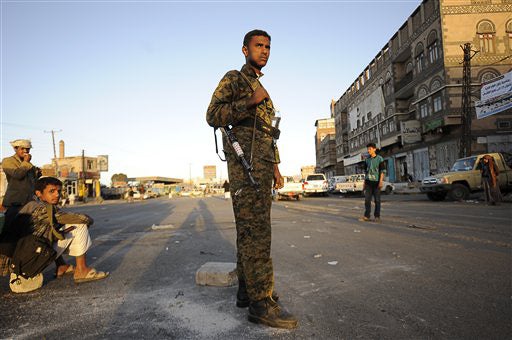|
February 20, 2015
Stanford expert calls for national security strategy toward failed states
Stanford scholar and former U.S. Ambassador Karl Eikenberry says that U.S. military intervention should be the exception, not the norm, toward failed states like Syria, Iraq and Yemen. When possible, it is better to rely on regional powers close to those countries. By Clifton B. Parker

A Houthi Shiite fighter stands guard in Sanaa, Yemen, after Shiite rebels took control of the country in early February. A Stanford scholar says the U.S. must take seriously the threat of failed states but should avoid taking the lead in tackling every problem that arises. (Photo: AP Photo/Hani Mohammed)
From 9/11 to the rise of ISIS in Iraq and Syria, Boko Haram terrorism in Nigeria and the overthrow of the government in Yemen, "failed states" are often havens for terrorist plotting and planning.
The United States must take seriously threats emanating from areas beyond effective sovereign state control, but should avoid taking the lead in tackling every problem that arises, according to Stanford's Karl Eikenberry, the William J. Perry Fellow in International Security at the Center for International Security and Cooperation. He recently wrote an article for the Hoover Institution on developing a grand strategy for such threats.
Stanford News Service interviewed Eikenberry about the threat posed by failed states. He is a retired U.S. Army lieutenant general and former U.S. ambassador to Afghanistan.
What are failed states, and why do they fail?
A failed state is one that has lost its monopoly on the legitimate use of force within its boundaries. Failure has numerous causes – political, social, economic and external – but what matters most from a foreign policy perspective is the potentially dangerous symptom of power vacuums inside of a failed state.
Which ones are the greatest threats to the United States today, and why?
The advance of Islamic terrorist organizations from the Maghreb to the Middle East into the spaces created by failing and failed states perhaps poses the greatest threat to the United States and some of our important allies. I say "perhaps" because this threat may disappear rapidly when its inability to rule the territories it now controls inevitably becomes manifest. Still, we can't assume this will be the case and be passive – a proactive strategy is required. The possibility of contagion is real, and at a minimum, the threat must be contained.
What types of danger do these threats pose to the United States?
Basically, the categories or types of threats include:
- Sanctuary for terrorist groups that have the ability to attack U.S. interests (such as Yemen)
- Uncontrolled refugee migration from areas of conflict (such as Syria and Iraq)
- The disruption of international commerce and economic access (the piracy in the Gulf of Guinea or off the Somali coast)
- Loss of a key ally or security partner (for example, if the U.S. lost its navy base in Bahrain), which could result in a geostrategic gain in influence by a rival state power
- Contagion, or the spread of terrorism from one weak state to another (as in Libya)
- Diminishing America's global credibility when it finds it difficult to respond to large-scale humanitarian suffering (as in Syria)
What should the U.S. national security strategy be toward dealing with threats from failed states?
Of course, our approach to dealing with the threat depends on the nature of the threat and the geopolitical context. Dealing with Somalian-based pirates calls for a different campaign than that required to address an al-Qaida sanctuary in Yemen.
When should the U.S. militarily intervene in a failed state – and when should it show restraint?
U.S. military interventions should be exception, not the norm. Sending troops in is easy; getting them out is not. The quality of our armed forces is extraordinary. Our military can win any tactical battle in which it engages. But military wins don't necessarily add up to political victories. It is better to rely, whenever possible, on regional powers often more threatened by the presence of a failed state on their border than is a much-more-distant United States.
Why does it seem that right now we have more dangerously failed states – Libya, Syria, Yemen, etc.?
I believe we are seeing a number of states in parts of the Arab world failing for a variety of often-interrelated reasons. These include:
- Growing sectarian rivalries within the world of Islam
- Proxy wars fought between regional powers using weak states as their battlegrounds
- The still unresolved debate over the proper relationship between the state and religion in Muslim-majority countries
- The breakdown of state borders drawn during the colonial era and now increasingly challenged by demographic changes and eroding government control
Eikenberry is also an affiliate of the Shorenstein Asia-Pacific Research Center, the Center on Democracy, Development and the Rule of Law, and the Europe Center. As the U.S. ambassador to Afghanistan from 2009 to 2011, he led the civilian surge to reverse insurgent momentum and lay the groundwork for full Afghan sovereignty. Eikenberry had a 35-year career in the U.S. Army.
-30-
|